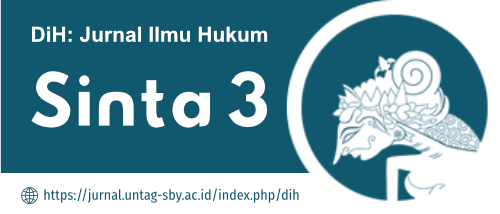WHY E-COMMERCE BUSINESS ETHICS NEEDS?
DOI:
https://doi.org/10.30996/dih.v15i2.2418Keywords:
e-commerce, business ethics, trustAbstract
Globalization and free trade supported by advances in telecommunications and informatics technologies have provided wider space. This shows that in Indonesia also gives a good impact for the economy with the advances in technology. Therefore, this technological advancement needs to be supported by the existence of business ethics that have principles that can create trust to consumers so as to provide wider space to the fulfillment of the quality of goods/services in accordance with the desires and capabilities of consumers. Currently it takes business ethics in e-commerce to minimize losses experienced by both parties in e-commerce transactions. The existence of business ethics in e-commerce, consumers can make transactions without hesitation, and can minimize the fraud that often occurs in e-commerce transactions.Downloads
Download data is not yet available.
References
Bertens, K., Pengantar Etika Bisnis (Yogyakarta: Kanisius, 2000)
Embse, Von der, and R.A. Wagley, ‘Managerial Ethics Hard Decisions on Soft Criteria’, Ad-vance Managemen Journal, 1988
Iwan, Permadi, and Imam Kuswahyono, ‘Penerapan Etika Bisnis Etnis Cina Dalam Kompleksitas Persaingan Usaha : Perspektif Antropologi Hukum’, 2007
Keraf, A. Sonny, Etika Lingkungan Hidup (Jakarta: Penerbit Buku Kompas, 2010)
Keraf, A. Sonny, and Mikhael Dua, Ilmu Pengetahuan (Sebuah Tinjauan Filosofis) (Yogyakarta, 2001)
Suherman, Ade Maman, Aspek Hukum Dalam Ekonomi (Jakarta, 2002)
Sukarmi;, Cyber Law: Kontrak Elektronik Dalam Bayang-Bayang Pelaku Usaha (Bandung: Pustaka Sutra, 2008)
Embse, Von der, and R.A. Wagley, ‘Managerial Ethics Hard Decisions on Soft Criteria’, Ad-vance Managemen Journal, 1988
Iwan, Permadi, and Imam Kuswahyono, ‘Penerapan Etika Bisnis Etnis Cina Dalam Kompleksitas Persaingan Usaha : Perspektif Antropologi Hukum’, 2007
Keraf, A. Sonny, Etika Lingkungan Hidup (Jakarta: Penerbit Buku Kompas, 2010)
Keraf, A. Sonny, and Mikhael Dua, Ilmu Pengetahuan (Sebuah Tinjauan Filosofis) (Yogyakarta, 2001)
Suherman, Ade Maman, Aspek Hukum Dalam Ekonomi (Jakarta, 2002)
Sukarmi;, Cyber Law: Kontrak Elektronik Dalam Bayang-Bayang Pelaku Usaha (Bandung: Pustaka Sutra, 2008)
Downloads
Published
2019-07-11
Issue
Section
Articles
License
Authors who publish with DiH: Jurnal Ilmu Hukum agree to the following terms:
- Authors transfer the copyright and grant the journal right of first publication with the work simultaneously licensed under a CC BY-SA 4.0 that allows others to share the work with an acknowledgement of the work's authorship and initial publication in this journal.
- Authors are able to enter into separate, additional contractual arrangements for the non-exclusive distribution of the journal's published version of the work (e.g., post it to an institutional repository or publish it in a book), with an acknowledgement of its initial publication in this journal.
- Authors are permitted and encouraged to post their work online (e.g., in institutional repositories or on their website) prior to and during the submission process, as it can lead to productive exchanges, as well as earlier and greater citation of published work (See The Effect of Open Access)










